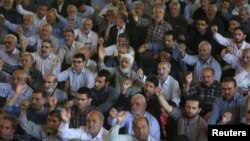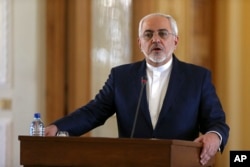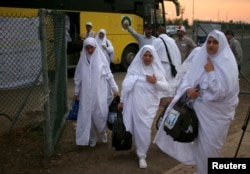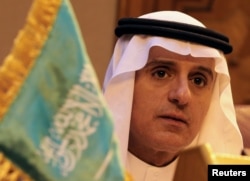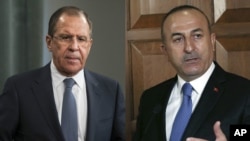Saudi Arabia and Iran are rethinking their rivalry and a highly tentative, as well as a deniable, courtship is underway, say analysts. But it is fraught pitfalls and last week in London Saudi Arabia’s foreign minister dismissed talk of a possible thaw as “laughable,” saying Iran would have to change its policies dramatically for that to happen.
Even so, Riyadh has softened its opposition to Syria’s President Bashar al-Assad, Iran’s ally, and has dialed down its own sectarian rhetoric against the mullahs in Tehran.
And Iranian Foreign Minister Mohammad Javad Zarif said last week his country, a majority-Shi’ite country, is ready for dialogue with Sunni Muslim Saudi Arabia to see how they can overcome their enmity and end a decades-long battle for influence across the Middle East.
“We are prepared to cooperate with Islamic countries on all issues that are important to the Islamic world,” Zarif told a local news outlet. “If the Saudi government is ready to turn the page, Iran is ready for that as well,” he added.
At first glance, any rapprochement, however mild, between the rivals would appear unlikely. Each accuses the other of subverting regional security and they are supporting opposite sides in conflicts in Syria, Iraq and Yemen.
But efforts to ease tensions between the Gulf rivals has been on display the past few months. In Mecca, the annual haj (pilgrimage) was attended by an estimated 90,000 Shi’ite Iranians after Tehran lifted a boycott imposed last year amid sharp tensions between Iran and the Saudis. Mecca authorities went out of their way to welcome Iranian worshippers and were praised for doing so by Tehran.
Iranian President Hassan Rouhani suggested a trouble-free hajj would help build confidence in other areas of dispute between the arch-rivals. “If our pilgrims come back satisfied, and if Saudi Arabia’s behavior is within religious and international frameworks, I think the situation would be more convenient to resolve the issues,” he was quoted as saying by state news agency IRNA earlier this year.
A difficult path
Hajj has ended, but engineering a rapprochement won't be easy, as was stressed by Saudi Arabia’s foreign minister at an event last week in London.
“We have an Iran which is on the rampage, that has to decide whether it is a revolution or a nation state, that part of it seeks to restore the Persian empire from thousands of years ago, and another part of it seeks a better future for its people and that supports terrorism and interferes in the affairs of others,” warned Adel Al-Jubeir speaking Thursday at Chatham House, a London-based policy research group.
He added, “Iran believes in exporting its revolution... supports terrorism, smuggles weapons into neighboring countries and tries to destabilize.” He sadi Iran needs to live by international rules, be neighborly and stop interfering in the affairs of others, otherwise “it will be difficult to accept them.”
He stressed, though, the Saudi kingdom would approach regional issues with a “pragmatic, practical and non-ideological” mind.
Complicated regional politics
A changing and volatile Middle East at least makes the timing right for attempts to ease hostilities, say analysts. “The two states, who have clashed in multiple countries, now find themselves in a new political situation which may force them to work together,” according to analyst Baraa Sabri.
He argues that “at the very least they may have to modify their respective policies by reinforcing those that could help lead to a rapprochement and by turning a blind eye to the most contentious matters between them, Syria and Yemen, even if only temporarily.”
Factors pushing Riyadh and Tehran to re-think include a developing Turkish-Russian alliance and doubts about Moscow, allied to Iran, and Washington, an ally of the Saudis, are to be trusted.
In August, for all his public dismissal now of the possibility of improved relations, the Saudi foreign minister shook hands with his Iranian counterpart at a meeting in Istanbul of the Organization of Islamic Cooperation, of which Iran and Saudi Arabia are members. At the meeting, Iran’s Zarif called for re-establishing diplomatic relations between the two countries and said the two may soon exchange diplomatic visits.
But it will take more than a handshake or two and a few diplomatic exchanges to bridge the huge sectarian gap between the two countries. Analyst Bruce Riedel of the Washington-based Brookings Institution scorns the idea of an Iranian-Saudi thaw, arguing Saudi monarch Salman bin Abdul-Aziz al-Saud is “the most hostile king toward Iran since the Iranian Revolution.”




